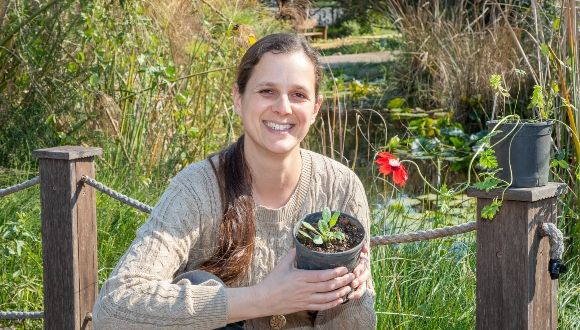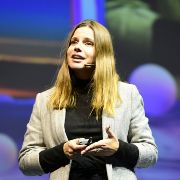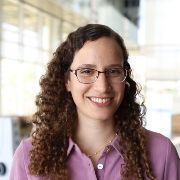Saving Endangered Species, One Plant at a Time
Israeli population growth, climate change and development are shrinking habitats for local plants and animals. At the same time, conservation efforts of researchers, nature park workers, farmers, and concerned citizens aim to preserve plant biodiversity and endangered plant species.
One such researcher is Merav Lebel Vine, a PhD candidate in Dr. Yuval Sapir’s lab at Tel Aviv University’s School of Plant Sciences and Food Security in the Wise Faculty of Life Sciences. Lebel Vine is a passionate conservationist. Her research focuses on reintroducing endangered native plants to new habitats in the hope of keeping them from going extinct as their own, natural habitats are overtaken by urban sprawl, agriculture and the effects of global warming.
“There are very few natural sites left,” she says. “Plants that are at risk for extinction are coming closer to the brink, and those that are native to Israel simply don’t exist anywhere else."
Lebel Vine’s research is partially supported by the Silvia Winnikow Fellowship Fund for Environmental Research, allocated through TAU’s Porter School of the Environment and Earth Sciences as part of PlanNet Zero, its Climate Crisis Initiative. The Fellowship is awarded each year to graduate degree-level students with research advancing climate change solutions, especially that which could affect Israel’s future.
“Conservation is My Life’s Work”
Lebel Vine fell in love with plants from a young age and is involved in a number of projects to preserve them outside of her PhD.
After completing her BA and MA at TAU, she began working at the Israel Nature and Parks Authority (NPA), where she has been helping to preserve and map endangered plants and possible reintroduction sites for close to a decade.
She was also involved in the Open Landscape Institute at the Steinhardt Museum of Natural History where she coordinated an ongoing yearly survey of endangered and rare plants in Israel, keeping the national database as up-to-date as possible. Additionally, she has worked with a group of botanists who train non-professionals on observing and identifying Israeli Flora.
"Not all endangered plants are pretty flowers,” says Lebel Vine, “but they all have a place in biodiversity and a role in their own ecosystems. We still have to protect them no matter what they look like. But just for the record, I think they are all beautiful!"
The Efforts of Many
In speaking on her work, Lebel Vine highlights how much conservation relies on collaboration. She is able to do her reintroduction research thanks to local farmers and the youth village Hakfar Hayarok who dedicate areas of their properties to her endangered plants for growth and observation. Her lab receives seeds from the Israeli Gene Bank, and much of her plant mapping data comes from non-professionals who simply care enough to look for endangered plants and report findings in their free time.
Lebel Vine holds the seeds and sprouts of a plant she is attempting to conserve through reintroduction (Photo: Rafael Ben-Menashe/TAU)
One of the most important resources helping to advance this conservation work is grants and scholarships such as the Winnikow Fellowship. The research funded by the Fellowship is crucial at this moment considering the rapidly-growing effects of climate change.
“When I first started in this field, climate change was only beginning to enter the discussion,” says Lebel Vine. “Now, it is an inevitability.” Her reintroduction efforts require not only finding undeveloped land, but trying to predict which habitats will become inhospitable in the near and distant future because of rising temperatures.
Women Sustaining Women
The Sylvia Winnikow Fellowship Fund for Environmental Research was inaugurated by Australian donors Peter Smaller and his wife Elaine in 2008 in honor of Peter’s mother, Sylvia Smaller-Winnikow, in cooperation with KKL-JNF.
Says Peter Smaller, “Sylvia Smaller became a member of the TAU Board of Governors when she made aliyah from Cape Town in 1976. She was a great Zionist, having first visited Israel in 1951. Elaine and I decided to honor her passion for the University, in her lifetime, by creating the Fellowship Fund for Environmental Research in her name. We delight in meeting the recipients on our visits to the university.”
Smaller-Winnikow was an accomplished businesswoman in the steel industry and an active supporter of Israel and TAU, helping to establish the Australian Friends of TAU and dedicating time and resources to Jewish and Zionist organizations all her life. Before moving to Israel and then Australia, she was known as the “Iron Lady” in South Africa as the country’s first female chair of a public company. She staunchly believed in the ability of Israeli universities to advance health and sustainability solutions, saying, “Israel is lacking in natural resources, but makes up for this in human capital and the admirable ability of the universities in Israel to develop it.”
As of 2021, the Fellowship’s funds are allocated through TAU’s Climate Crisis Initiative, PlanNet Zero. Lebel Vine says the funding has helped her focus on her research and gave her a year’s head start on her work, an invaluable asset given the time-sensitive nature of extinction prevention.
"Unfortunately, I can't just be a student—I work at the the Israel Nature and Parks Authority and I have two children and a home to manage, so this scholarship helps me dedicate more time to my research. Also, when I first joined the TAU lab, there was no funding available for my project, so the Fellowship enabled me to start a year sooner.”
Because We Care
Lebel Vine plans to continue working in conservation for as long as she can. She says that though the work is becoming ever more difficult, biodiversity is important in and of itself. “Without all the different plant life we have, the world would be a less interesting and lonelier place, and that is reason enough to care,” she says, referencing a Douglas Adams quote. “That is why we do this work. Simply because we care.”
--by Ruth Fertig






